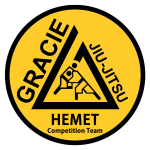Call Us Today! (951) 603-4202 | info@mygraciehemet.com
Overtraining in Jiu-Jitsu: How to Identify and Avoid It
Jiu-jitsu is a martial art that demands intense physical effort, mental resilience, and dedication. However, like any high-performance activity, overtraining can be a major enemy for practitioners, negatively affecting both performance and long-term health. In this article, we will explore what overtraining is, how to identify it, and, most importantly, how to avoid it.

What is Overtraining?
Overtraining is a state where the body is unable to recover properly from training due to insufficient rest, inadequate recovery, or excessive training without proper balance. In jiu-jitsu, this can occur when training sessions are overly intense, or when a practitioner trains too many hours per week without allowing their body enough time to rest.
While jiu-jitsu is a sport rich in technique and strategy, the physical intensity of training, especially during competitions or sparring sessions, can put a heavy strain on the body. Without balance and proper recovery, excessive training can lead to a range of harmful consequences.
Symptoms of Overtraining in Jiu-Jitsu
Identifying overtraining can be tricky since the symptoms are not immediate and often resemble the normal fatigue from intense training. However, common signs include:
- Excessive Fatigue – Feeling constantly tired, even after a full night’s sleep, is one of the primary signs of overtraining.
- Performance Decline – Despite training more, results do not improve. The body can no longer perform at the same level.
- Frequent Injuries – Overtraining weakens the immune system and increases the risk of injuries like muscle strains and stress fractures.
- Changes in Appetite and Sleep – Eating disorders and trouble sleeping are common among those who overtrain.
- Mood Swings – Irritability, depression, and feelings of hopelessness can arise due to hormonal imbalance and lack of recovery.
Causes of Overtraining in Jiu-Jitsu
Overtraining in jiu-jitsu can have several causes, including:
- Excessive High-Intensity Training – Participating in multiple jiu-jitsu classes and sparring sessions without allowing the body time to recover.
- Lack of Proper Rest – Not incorporating enough rest days or failing to prioritize adequate sleep for muscle recovery.
- Lack of Active Recovery – When the body is not encouraged to recover through low-impact activities like stretching or light walking, the risk of overtraining increases.
- Imbalance Between Physical and Mental Training – Mental stress also impacts physical performance, and many jiu-jitsu practitioners neglect this aspect.
How to Avoid Overtraining
Avoiding overtraining requires a balance between physical effort and rest. Here are some practical tips to maintain health and performance in jiu-jitsu:
Plan Proper Rest Include rest days in your training routine. Even the best jiu-jitsu athletes need time to recover and allow muscles to rebuild. A full rest of 1-2 days per week is essential to prevent overtraining.
Focus on Active Recovery Use active recovery days for activities like yoga, stretching, or even light walking. This helps relieve muscle tension without overloading the body.
Maintain a Proper Diet Make sure your diet provides the necessary nutrients for recovery. Adequate protein, complex carbohydrates, and healthy fats are crucial for the muscle recovery process.
Prioritize Sleep Sleep is one of the most important aspects of physical recovery. Ensure you get between 7 to 9 hours of sleep per night to allow your body time to regenerate.
Listen to Your Body Learn to recognize signs of fatigue and injury. If something doesn’t feel right, don’t be afraid to reduce intensity or take a break. Training through pain is not a sign of progress but a sign that your body is asking for rest.
Vary Your Training Types In addition to jiu-jitsu, include other forms of training to avoid overloading the same muscles. Activities like weightlifting or cardiovascular training can help improve your physical condition without putting too much stress on your joints.
Talk to Your Instructor If you notice your performance is declining or you’re feeling constantly exhausted, talk to your instructor. They can help adjust your training load or recommend recovery strategies.
Conclusion
Overtraining in jiu-jitsu is a real issue that can affect both beginners and experienced athletes. Understanding the signs and taking preventative measures, such as proper rest, balanced nutrition, and a smart training routine, is key to continuing to improve without harming your health. Remember: rest is just as important as training, and both should be balanced for success on the mat.
Sources:
- “Overtraining in Athletes: Symptoms, Causes and Solutions,” Journal of Sports Science and Medicine
- “Overtraining and Recovery in Athletes,” National Strength and Conditioning Association
- “The Importance of Rest in Martial Arts Training,” Jiu Jitsu Times

